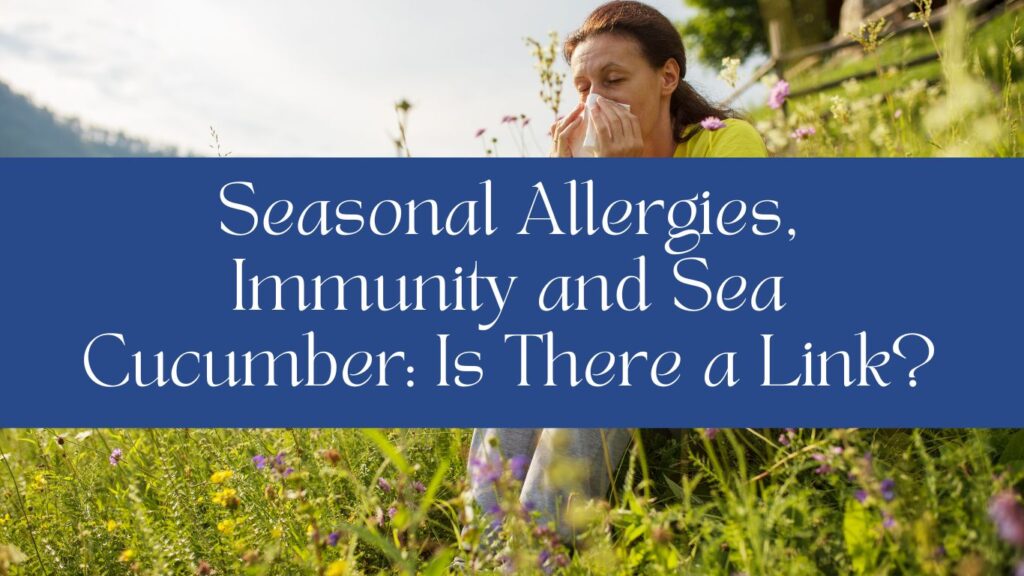Seasonal Allergies, Immunity and Sea Cucumber: Is There a Link?

Seasonal Allergies, Immunity and Sea Cucumber: Is There a Link?
Who doesn’t love when flowers bloom in spring? But for many, the season brings an uncomfortable and even debilitating issue: seasonal allergies. In this post, we discuss the link between immune system function and allergies, and the potential role of sea cucumber.
Typically caused by pollen, symptoms of seasonal allergies include sneezing and a runny, itchy nose and throat. If you experience these symptoms seasonally, you might have what is commonly referred to as a “hay fever” allergy. Research has shown that these types of seasonal pollen triggered allergies are highly genetic – and very common.
The clinical symptoms caused by exposure to pollen (the allergen) include allergic rhinitis, conjunctivitis and asthma which are triggered when pollen is inhaled. Weather patterns play into the length and severity of the allergic episodes which explains why some spring seasons may cause more severe episodes than others.
What causes pollen allergies?
When suffering from a “hay fever” allergic episode, our immune system will mistake harmless airborne pollen molecules for invading pathogens. Once the immune system identifies the invading pollen, it will trigger an immune response to produce targeted antibodies to combat it.
Once the antibodies come in contact with the pollen molecules, they signal the immune system to release biochemical amines into the bloodstream. These amines then trigger the symptoms: a runny nose, itchy throat, and sneezing.
How is a pollen allergy diagnosed?
Your general practitioner can diagnose a pollen allergy based on your symptoms, medical history and physical examination.
Since antibodies are unique to each invading molecule, the allergist can use the blood to view and identify your unique blood-borne antibodies for the specific pollen type(s).
What are some tips for preventing or avoiding pollen allergies?
It is difficult to avoid pollen because it is airborne. The best way to combat the allergy is to reduce exposure to the allergen to reduce the chance of developing severe symptoms.
Some ways to limit allergen exposure are:
- Avoid pollen sources as much as possible.
- Reduce outdoor time on sunny days or choose instead to go out in the early morning or evening.
- When returning home from the outdoors, make sure to change clothes and shower or bathe to prevent pollen coming into your home.
- Use a high-filtration air purifier or air conditioner at home to filter foreign pollen molecules.
What methods or medicines can help relieve seasonal allergy symptoms?
Unfortunately, it is not always possible to avoid exposure to pollen. When exposure cannot be avoided, there are a few ways to help relieve seasonal allergy symptoms:
Symptomatic Treatment
To treat symptoms directly, the use of antihistamines is prescribed. These pharmaceuticals combat the amines in the blood triggering the allergic response.
For patients with severe symptoms, hormonal nasal sprays can be used to treat the allergic rhinitis and conjunctivitis. Check with your healthcare practitioner to find the right treatment for you.
Anti-immunoglobulin therapy
For those suffering with severe symptoms, an anti-immunoglobulin therapy can be used. It is administered by subcutaneous injection once a month in most cases. Ask your doctor about this.
Immunotherapy
The principle of immunotherapy is to gradually expose the immune system to the pathogen in order to gradually teach the immune system to treat each exposure with decreasing severity. In the case of seasonal allergies, the patient is injected with pollen extract in a controlled, gradually increasing dose to make the immunological changes associated with exposure to be more efficient and less severe with each dose.
Immune improvement: a potential role of sea cucumber?
A simple way to help combat the severity of seasonal allergy symptoms is to improve your physical health and boost your own immune system to combat the allergic response. Adhering to a healthy diet, regular exercise, getting regular and enough sleep and avoiding stress are great ways to maintain physical health and immunity.
In terms of giving your immune system a boost, experiments conducted in rodent models have shown that the polysaccharides found in sea cucumber have anti-inflammatory and anti-allergic effects.
Research is early, but this suggests that long-term consumption of sea cucumber during allergy season may help regulate the body’s immune system and improve the ability of the immune system to fight allergic reactions.
More evidence is needed, but this is a promising area to watch!
Sea cucumber has also been shown to inhibit the infiltration of immune cells into the nasal mucosa and lungs, reducing symptoms of an allergic response.
Recently, a customer of ours shared that she stopped sneezing after consuming rehydrated dried sea cucumber (from our Rosalyn line of sea cucumber food products). This is anecdotal, to be sure—more research is needed to support this intriguing effect— but it’s worth thinking thinking about!
In animal experiments, researchers observed that ginseng extract can help to relieve airway inflammation by activation of asthma-related cells in the lungs, effectively fighting the clinical signs of an asthmatic episode.
It will be exciting to see how this area of research on sea cucumber and allergy advances.
What do experts recommend?
There is currently no surefire way to cure a pollen allergy, and more patients suffer from repeated occurrences every year. The symptoms can be treated, however the immune system will still suffer repeated exposures over and over again.
Sea cucumber is available as a nutritional supplement with high nutritional value. Nova Sea Atlantic sea cucumber is 100% sustainably wild-caught from the North Atlantic ocean. Learn more about Nova Sea Atlantic today.